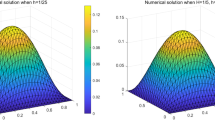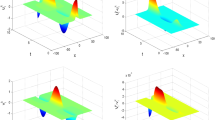Abstract
In this paper, we analyze a space-time finite element method for fractional wave problems involving the time fractional derivative of order γ (1 < γ < 2). We first establish the stability of the proposed method and then derive the optimal convergence rate in H1(0,T;L2(Ω))-norm and suboptimal rate in discrete \( L^{\infty }(0,T;{H_{0}^{1}}({\Omega })) \)-norm. Furthermore, we discuss the performance of this method when the true solution has singularity at t = 0 and show that optimal convergence rate with respect to H1(0,T;L2(Ω))-norm can still be achieved by using graded temporal grids. Finally, numerical experiments are performed to verify the theoretical results.
Similar content being viewed by others
References
Brenner, S., Scott, R.: The mathematical theory of finite element methods, 3rd edn. Springer, New York (2008)
Ciarlet, P.: The finite element method for elliptic problems. Society for Industrial and Applied Mathematics (2002)
Cao, J., Xu, C.: A high order schema for the numerical solution of the fractional ordinary differential equations. J Comput. Phys. 238(2), 154–168 (2013)
Diethelm, K.: The analysis of fractional differential equations. Springer, Berlin (2010)
Ervin, V., Roop, J.: Variational formulation for the stationary fractional advection dispersion equation. Numer. Meth. Part. D. E. 22(3), 558–576 (2006)
Ford, N., Simpson, A.: The numerical solution of fractional differential equations: speed versus accuracy. Numer. Algor. 26(4), 333–346 (2001)
Gao, G., Sun, Z.: A compact finite difference scheme for the fractional sub-diffusion equations. J Comput. Phys. 230(3), 586–595 (2011)
Hardy, G., Littlewood, J., Pólya, G.: Inequalities. Cambridge Mathematical Library Cambridge University Press (1988)
Huang, J., Tang, Y., Vázquez, L., Yang, J.: Two finite difference schemes for time fractional diffusion-wave equation. Numer. Algor. 64(4), 707–720 (2013)
Jin, B., Lazarov, R., Zhou, Z.: Two finite difference schemes for time fractional diffusion-wave equation. SIAM J. Sci. Comput. 38(1), A146–A170 (2016)
Li, D., Liao, H., Sun, W., Wang, J., Zhang, J.: Analysis of L1-Galerkin FEMs for time fractional nonlinear parabolic problems. Commu Comput. Phys. 24, 86–103 (2018)
Li, B., Wang, T., Xie, X.: Analysis of the L1 scheme for fractional wave equations with nonsmooth data. arXiv:1908.09145 (2019)
Li, B., Wang, T., Xie, X.: Analysis of a time-stepping discontinuous Galerkin method for fractional diffusion-wave equation with nonsmooth data. arXiv:1908.09189 (2019)
Li, B., Wang, T., Xie, X.: Numerical analysis of a semilinear fractional diffusion equation. arXiv:1909.00016 (2019)
Li, B., Luo, H., Xie, X.: Analysis of a time-stepping scheme for time fractional diffusion problems with nonsmooth data. SIAM J. Numer. Anal. 57(2), 779–798 (2019)
Li, B., Luo, H., Xie, X.: A time-spectral algorithm for fractional wave problems. J. Sci. Comput. 77(2), 1164–1184 (2018)
Li, B., Luo, H., Xie, X.: Error estimates of a discontinuous Galerkin method for time fractional diffusion problems with nonsmooth data. arXiv:1809.02015 (2018)
Luo, H., Li, B., Xie, X.: Convergence analysis of a Petrov–Galerkin method for fractional wave problems with nonsmooth data. J. Sci Comput. 80(2), 957–992 (2019)
Liu, Q., Liu, F., Turner, I., Anh, V.: Finite element approximation for a modified anomalous subdiffusion equation, vol. 35 (2011)
Li, X., Xu, C.: A space-time spectral method for the time fractional diffusion equation. SIAM J. Numer. Anal. 47(3), 2108–2131 (2009)
Meerschaert, M., Tadjeran, C.: Finite difference approximations for fractional advection-dispersion flow equations. J. Comput. Appl. Math. 172(1), 65–77 (2004)
Mclean, W., Mustapha, K.: Time-stepping error bounds for fractional diffusion problems with non-smooth initial data. J Comput. Phys. 293(C), 201–217 (2015)
Mustapha, K.: Time-stepping discontinuous Galerkin methods for fractional diffusion problems. Numer. Math. 130(3), 497–516 (2015)
Mustapha, K., Abdallah, B., Furati, K.: A discontinuous Petrov-Galerkin method for time-fractional diffusion equations. SIAM J. Numer. Anal. 52(5), 2512–2529 (2014)
Mustapha, K., Mclean, W.: Discontinuous Galerkin method for an evolution equation with a memory term of positive type. Math. Comp. 78(268), 1975–1995 (2009)
Mustapha, K., Mclean, W.: Superconvergence of a discontinuous Galerkin method for fractional diffusion and wave equations. SIAM J. Numer. Anal. 51(1), 491–515 (2012)
Mustapha, K., Mclean, W.: Uniform convergence for a discontinuous Galerkin, time-stepping method applied to a fractional diffusion equation. IMA J. Numer. Anal. 32(3), 906–925 (2012)
Mustapha, K., Schötzau, D.: Well-posedness of hp-version discontinuous Galerkin methods for fractional diffusion wave equations. IMA J. Numer. Anal. 34(4), 1426–1446 (2014)
Podlubny, I.: Fractional differential equations. Academic Press (1998)
Ren, J., Long, X., Mao, S., Zhang, J.: Superconvergence of finite element approximations for the fractional diffusion-wave equation. J. Sci. Comput. 72(3), 917—935 (2017)
Samko, S., Kilbas, A., Marichev, O.: Fractional integrals and derivatives: theory and applications. Gordon and Breach Science Publishers, USA (1993)
Schötzau, D., Schwab, C.: Time discretization of parabolic problems by the hp-version of the discontinuous Galerkin finite element method. SIAM J. Numer. Anal. 38(3), 837–875 (2000)
Sun, Z., Wu, X.: A fully discrete difference scheme for a diffusion-wave system. Appl. Numer. Math. 56(2), 193–209 (2006)
Thomée, V.: Galerkin finite element methods for parabolic problems. Springer, Berlin (2006)
Tartar, L.: An introduction to Sobolev spaces and interpolation spaces. Springer, Berlin (2007)
Wang, Z., Vong, S.: Compact difference schemes for the modified anomalous fractional sub-diffusion equation and the fractional diffusion-wave equation. J. Comput. Phys. 277, 1–15 (2014)
Yuste, S.: Weighted average finite difference methods for fractional diffusion equations. J. Comput. Phys. 216(1), 264–274 (2006)
Yuste, S., Acedo, L.: An explicit finite difference method and a new von Neumann–type stability analysis for fractional diffusion equations. SIAM J. Numer. Anal. 42(5), 1862–1874 (2005)
Yang, Y., Chen, Y., Huang, Y., Wei, H.: Spectral collocation method for the time-fractional diffusion-wave equation and convergence analysis. Comput. Math. Appl. 73(6), 1218–1232 (2017)
Zhao, L., Deng, W.: Short memory principle and a predictor–corrector approach for fractional differential equations. J. Comput. Appl. Math. 40(1), 137–165 (2014)
Zayernouri, M., Karniadakis, G.: Discontinuous spectral element methods for time- and space-fractional advection equations. SIAM J. Sci. Comput. 36(4), B684–B707 (2014)
Zayernouri, M., Karniadakis, G.: Exponentially accurate spectral and spectral element methods for fractional odes. J. Comput. Phys. 257(2), 460–480 (2014)
Zayernouri, M., Karniadakis, G.: Fractional spectral collocation method, vol. 36 (2014)
Zheng, M., Liu, F., Turner, I., Anh, V.: A novel high order space-time method for the time fractional Fokker-Planck equation, vol. 37 (2015)
Funding
Binjie Li was supported in part by National Natural Science Foundation of China (11901410), and Xiaoping Xie was supported in part by National Natural Science Foundation of China (11771312).
Author information
Authors and Affiliations
Corresponding author
Additional information
Publisher’s note
Springer Nature remains neutral with regard to jurisdictional claims in published maps and institutional affiliations.
Appendices
Appendix A: Properties of fractional calculus operators
Lemma A.1
[4, 29, 31] Let \( -\infty < a < b < \infty \). If \( 0 < \alpha , \beta < \infty \), then
If \( 0 < \alpha < \beta < \infty \), then
Lemma A.2
[5] Assume that \( -\infty < a < b < \infty \) and 0 < α < 1/2. If v ∈Hα(a,b), then
Lemma A.3
Suppose that \( -\infty < a < b < \infty \) and 0 < α < 1/2. If v,w ∈Hα(a,b), then
Proof
By the definition of \(\left \vert \kern -0.25ex\left \vert \kern -0.25ex\left \vert \kern -0.25ex{\cdot }\right \vert \kern -0.25ex\right \vert \kern -0.25ex\right \vert \kern -0.25ex_{H^{\alpha }(a,b)} \), this lemma is a direct consequence of Lemma A.2. □
Lemma A.4
If α ∈ [0, 1) ∖{0.5} and \( 0 < \beta < \infty \), then
for all \( v \in H_{0}^{\alpha }(0,1) \).
Proof
The proof is a simple modification of that of [16, Lemma 5.7]. Let us first prove that
for all w ∈L2(0, 1) and 0 < β < 1. Extending w to \( \mathbb{R} \backslash (0,1) \) by zero, we define
Since 0 < β/2 < 1/2, a routine calculation yields \( G \in L^{2}(\mathbb{R}) \), and then [31, Theorem 7.1] implies
where \( \mathcal{F}: L^{2}(\mathbb{R}) \to L^{2}(\mathbb{R}) \) is the Fourier transform operator, and i is the imaginary unit. From the well-known Plancherel Theorem, it follows
and hence
In addition, if \( w \in {H_{0}^{1}}(0,1), \) then, since
the estimate (28) implies
Consequently, [35, Lemma 22.3] yields
Therefore, since \(\text {I}_{1-}^{\beta } w = \text {I}_{1-}^{\beta /2} \text {I}_{1-}^{\beta /2} w \), combining (28) and (29) indicates that (27) holds for all w ∈L2(0, 1) and 0 < β < 1.
Next, let us proceed to prove (26) . Since the case of \( \beta \in \mathbb{N} \) is trivial, we assume that k < β < k + 1 with \( k \in \mathbb{N} \), and so it suffices to prove
Since we have already prove that (27) holds for all w ∈L2(0, 1) and 0 < β < 1, we obtain
Therefore, using [35, Lemma 22.3] again proves (30) and thus concludes the proof of this lemma. □
Appendix B: Three inequalities
Lemma A.5
Let \( 0\leqslant a < b < \infty \) and \( 0 \leqslant \alpha < 1 \). If \( v^{\prime } \in L^{2}_{\delta }(a,b) \) with \( 0\leqslant \delta < 1 \), then
Moreover, if v(b) = 0, then
Proof
Let us first establish (32). For a < t < b, a simple computing gives
so that we obtain
namely, estimate (32). Similarly, we can derive (33) by that
Then, let us prove (31). Since
applying Minkowski’s integral inequality (cf. [8, Eq. 6.13.9]) yields that
Finally, the inequality (31) is a direct consequence of
This lemma is thus proved. □
Rights and permissions
About this article
Cite this article
Li, B., Luo, H. & Xie, X. A space-time finite element method for fractional wave problems. Numer Algor 85, 1095–1121 (2020). https://doi.org/10.1007/s11075-019-00857-w
Received:
Accepted:
Published:
Issue Date:
DOI: https://doi.org/10.1007/s11075-019-00857-w




